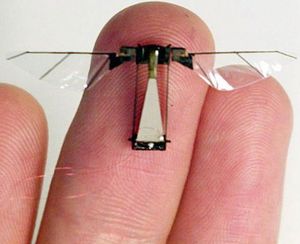Bugs and boredom


Here's how it works: When the insect is in its pupal stage (and thus still developing toward adulthood), small components are inserted into various parts of its body and brain. As it matures, it grows around the components and can then, to some extent, be controlled. (For obvious reasons, they use especially large insects.) So, for example, one research group was able to "drive" a cyborg june bug through the air. I get the impression that the technology is still very much in its pupal stage. It also has the disadvantage of being, bar none, the most disgusting example of high tech I've ever encountered.
So What?
Governments can be relied upon to use this technology to the fullest extent of the law and, if necessary, to change the law as they see fit. But this is a secondary consideration.
What really matters are civilian applications. Yes: This technology will one day get into the hands of the private sector where it will reshape society and drive significant cultural change. Think about it: No matter where you were, you'd have to assume you were being watched by invisible insects (there's a paranoid fantasy) and that videos of anything interesting would wind up on the Web.
Watched by whom, you ask? Jealous (ex-) spouses. Suspicious landlords. Curious teenagers. Private investigators. Nosy neighbors. In short, anyone with an interest and (say) $50 for the kit.
One upshot of the technology: Psychiatry will grind to a halt--indeed, the idea of a confidential doctor-patient relationship will have to be rethought entirely. (Maybe it'll become a doctor-patient-YouTube relationship.) Your only hope of privacy, really, will be to remain as unassuming and bland as possible; to keep your head down and provide no entertainment value whatsoever.
Or maybe I'm wrong--maybe they'll never get the kinks worked out of the technology. If that's the case, we can avoid a quotation even more chilling than Stalin's famous, "The innocent have nothing to fear." To wit, "The boring will be left in peace."